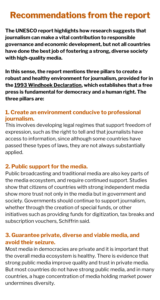 Accurate, high-quality information offered to the public through professional journalism has a positive influence on democracy, civic engagement, accountability of government entities and the fight against corruption, according to a recent report issued by UNESCO.
Accurate, high-quality information offered to the public through professional journalism has a positive influence on democracy, civic engagement, accountability of government entities and the fight against corruption, according to a recent report issued by UNESCO.
The issue brief, “Journalism for development: the role of journalism promoting democracy and political accountability and sustainable development,” also maintains that public investment in journalism improves social trust and has important effects on the protection and promotion of human rights, as well as sustainable development.
The report, prepared by researchers Joseph E. Stiglitz, Anya Schiffrin and Dylan W. Groves, analyzed and compiled the most recent research and rigorous methodological tools carried out and applied by social scientists in recent years, and which confirm the benefits of journalism, particularly in the Global South.
“We know how important journalism is, and how important it is for more democracy, and accountability and for society and it’s a public good, and I feel journalists have been saying that for years,” said Anya Schiffrin, one of the report’s authors, told LatAm Journalism Review (LJR).
“I think that the point of the issue brief is to put that out for different audiences, for an audience of policy makers and government. And we know more now, obviously in the world of journalism we thought for years journalism is important, but now there’s actually been all these rigorous analytical studies explaining how that works,” said Schiffrin, who is director of the technology, media and communications specialization at the School of International and Public Affairs at Columbia University.
These positive effects of quality journalism on democracy, accountability and the fight against corruption are particularly relevant in the current context of continuous attacks on freedom of expression and the press in the world and in regions such as Latin America, the researchers agreed. The report also highlights the value of accurate information and quality journalism in the face of the harmful effects of disinformation and loss of trust in journalism.
In this regard, Guilherme Canela, head of the Freedom of Expression and Safety of Journalists section at UNESCO, explained that the objective of this report and others that are being done, is to counteract a movement that began a few years ago by different powerful actors, whether politicians, celebrities, or others, to construct narratives that seek to generate deep distrust in journalism as a key institution for democratic consolidation.
“Narratives like ‘all press is corrupt,’ or ‘the press is fake news,’ or that ‘all press is associated with powerful elites.’ These narratives end up leading to a common consequence, which is this discrediting, in the eyes of the entire population, of the idea that journalism has a fundamental function in the machinery of democracy,” Canela said.
And that, he added, consolidates a mistaken perception that freedom of expression is a right of journalists, when what society should understand is that freedom of expression is much more than that.
“It is an individual right of everyone, and at the same time it is a collective right of our society,” he said. “When there is an attack on journalism, we have to find ways to make the population as a whole understand that this attack at the end of the day is an attack on society.”
Recently, within the framework of the celebration of World Press Freedom Day in Chile, environmental journalists denounced the threats and censorship they face for their work; and according to a UNESCO survey, more than 70% of journalists reported that they were subjected to attacks, threats or pressure while covering environmental issues.
One of the findings of the new report is how journalism faces many difficulties, including laws that limit free expression and the domination of advertising revenue by Google and Meta. And since quality journalism is a public good, it is subject to free-riding, in which everyone wants someone else to pay for it. Therefore, it is unlikely to be provided in sufficient quantities without the support of governments and donors.
Canela said that these types of reports seek to demonstrate with very clear numbers that journalism generates very measurable impacts on key issues for daily life, such as combating corruption, protecting human rights, among others.
“If we get ordinary people to understand that where we do not have free, independent, plural journalism, the chances that we will have more corruption, less development, more violation of human rights, are high,” he said. ”If we can get people to understand that correlation, there will be a collective effort to protect journalism as a democratic institution.”
For the report to be better received by all audiences and have a greater impact, it is presented in a very accessible format, Schiffrin said. Additionally, experts from various disciplines were brought together to prepare it.
“The idea is that the government or busy people can kind of quickly learn about a subject. And, as you can see, the format is very practical, they pull out recommendations, and recommendations for different stakeholders,” she said.
Schiffrin noted that they hope the report will be very useful for journalists, for the journalism industry as such, and for journalism organizations that want to prove that quality information is very important.
“Anyone who’s trying to get government support or philanthropic funding, now they have something they can point to,” she said.
The UNESCO report presents the role of journalism in promoting democracy, accountability and sustainable development as something simple and clear, since without information about what governments are doing, how could citizens demand accountability?
“Information about what the government is doing, and what it should be doing, is what economists call a ‘public good,’ something which all benefit from—no one can be excluded,” the report said.
Journalism offers this public good, both in its role as an investigator, in the discovery of information, and in its role in the dissemination of information. In well-functioning political entities, information about inappropriate behavior, corruption or other forms of malfeasance has consequences, and knowing that such behavior will be discovered has a deterrent effect. The challenge is to have a sufficient supply of this public good.

In that sense, the report cites Amartya Sen's research, “The Food Problem: Theory and Policy,” which found that one of the reasons India did not have major famines, such as those seen in China after the Great Leap Forward, is because the press functioned as an early warning system and as a source of pressure for the government to attend to the needs of citizens.
Other researchers such as Tim Besley and Robin Burgess reviewed local media in India and found that, in those areas where there were more newspapers, the government response to natural disasters was faster and better than in other parts where there were fewer newspapers, according to their work, “Political agency, government responsiveness and the role of the media.”
The UNESCO report also cites how these research methodologies have raised new questions about why and under what circumstances journalism has effects. One of the contemporary questions is whether journalism can contribute to democratic governance in a context of increasing mis- and disinformation and declining trust in the media.
Research suggests that high-quality journalism and fact-checking can effectively counter disinformation, which is why UNESCO's report focuses on quality journalism and what can be done to maintain it, and not on social media and low-quality information environments.
According to the report, in the evaluation of results, the area that has received the most attention from researchers is electoral responsibility and the capacity for democratic response. Scholars have addressed these questions: Do citizens use media reports to hold governments accountable? And does this threat of accountability lead officials to take actions that respond to citizens' needs?
One reason media work can promote accountability is that politicians know they will be removed from office if they do not behave.
“Media reports increase citizen’s knowledge and influence their voting behavior,” the report said. Therefore, some scholars have studied whether voting patterns change when new media outlets and newspapers open or close.
Other research suggests that, in addition to stimulating political engagement, media publications about corruption and candidate performance can help voters make more and better-informed decisions about their preferred candidates.

In that sense, the UNESCO report cites the work of Claudio Ferraz and Frederico Finan entitled “Exposing Corrupt Politicians: The Effects of Brazil's Publicly Released Audits on Electoral Outcomes,” which shows how politicians who are identified as corrupt by media are less likely to be re-elected, an effect pronounced in places where there is greater radio coverage.
On the other hand, research in Mexico by Horacio Horacio Larreguy, John Marshall and James Snyder, draws on plausibly random variations in the reach of local media to show that local media allow voters to sanction candidates in response to corruption audits.
The study “Publicizing Malfeasance: When the Local Media Structure Facilitates Electoral Accountability in Mexico,” found that each new media outlet increases voter sanctions on corrupt mayors by about 1 percentage point. It shows that these effects are most pronounced in relatively media-poor areas, suggesting that the effect of new media stations on electoral accountability is strongest in areas with the lowest levels of media development.
In another study, also in Mexico and carried out with funding from UNESCO, researcher Eric Arias shows that media programs broadcast to the community as a whole are more effective in shaping social norms than messages transmitted individually.
Regarding the fight against corruption, the UNESCO report cites the work of political scientist Alina Mungiu-Pippidi, entitled “Controlling Corruption Through Collective Action,” which ensures that the fight against corruption is a collective action problem that the media can help solve. This points out that elections, and even some political competition, do not guarantee a society to be truly democratic.
And the fact is that in recent decades we have seen the election and re-election of several authoritarian figures, some of whom defend the idea of an illiberal democracy. Limiting corruption in the context of resurgence of illiberalism requires a civil society response.
“Civil society can be viewed as a form of voluntary ‘collective action’ among a group of citizens to advance their perspectives on what should be done within the public sphere,” the report said.

The UNESCO report says that there is a body of great research that shows that the media can play a vitally important role in this process. Take for example the work “The role of the media in fighting corruption.” These findings are supported by a historical analysis by Matthew Gentzkow, Edward Glaser, and Claudia Goldin, which documents the contribution of the newspaper boom of the late 19th century to the reduction of public corruption in the United States.
While journalists in some closed societies can and do expose corruption, it is important that the press not be captured and be free from external controls. The report cites that a pluralistic and diverse media environment helps journalists carry out their watchdog duties effectively and credibly to generate regulatory restrictions on corruption.
In this regard and in consideration of the contexts of authoritarian regimes and attacks on the press on the rise in the world, and in Latin America in particular, researcher Dylan Groves, assistant professor of Government and Law at Lafayette College and one of the authors of the UNESCO report, said that local journalism is especially important in these semi-authoritarian contexts.
“It is easy for national governments to claim ‘false news’ about issues that citizens do not experience directly. It is much harder for them to discredit journalism about things citizens see directly, such as missing medical supplies and impassable roads,” he told LJR.
Part of Groves' research currently focuses on whether and how quality local journalism can build trust in the media in general. He added that it is extremely vital to remind people why semi-authoritarian governments are so determined to try to shut down independent media.
“They know more than anyone else that independent media is among the greatest threats to their regimes,” he said.
Finally, the report places special emphasis on how press freedom is necessary for the media to reduce corruption, and cites Rudiger Ahrend's study “Press Freedom, Human Capital and Corruption,” which examines the correlation between press freedom and corruption. After adjusting for education levels, income levels, and trade openness, Ahrend finds a strong correlation between press freedom and lower levels of corruption.
“We find strong evidence that more press freedom leads to less corruption,” Ahrend said. “Increasing press freedom is thus an important indirect mechanism for fighting corruption.”
 Asked about what can be done and how journalism can help civil society in general collaborate in the defense of freedom of expression and the press and in maintaining quality journalism, Canela said that for different reasons journalism in different parts of the the world has not realized that journalistic investigation on the effects of the lack of freedom of expression in societies is a topic that should be central to journalistic practice itself.
Asked about what can be done and how journalism can help civil society in general collaborate in the defense of freedom of expression and the press and in maintaining quality journalism, Canela said that for different reasons journalism in different parts of the the world has not realized that journalistic investigation on the effects of the lack of freedom of expression in societies is a topic that should be central to journalistic practice itself.
“It is not enough to say that freedom of expression is a right. It is essential to show people the impacts of the reduction of this right, and I still believe that journalism, for different reasons, is not managing to do it and I have the feeling that it could help a lot. For example, journalistic coverage of crimes against journalists is very non-existent or of low quality in many places,” he said.
In this regard, Dylan Groves reiterated that one of the objectives of this UNESCO report is to have accurate information to respond to non-journalists, who sometimes have a more skeptical view of the impact of journalism.
“I always want to tell journalists: I know you are convinced of your impact, but we need to develop evidence that will convince non-journalists! My sense is that journalists do not always speak in the language of measurable impact that donors want to hear,” Groves said.